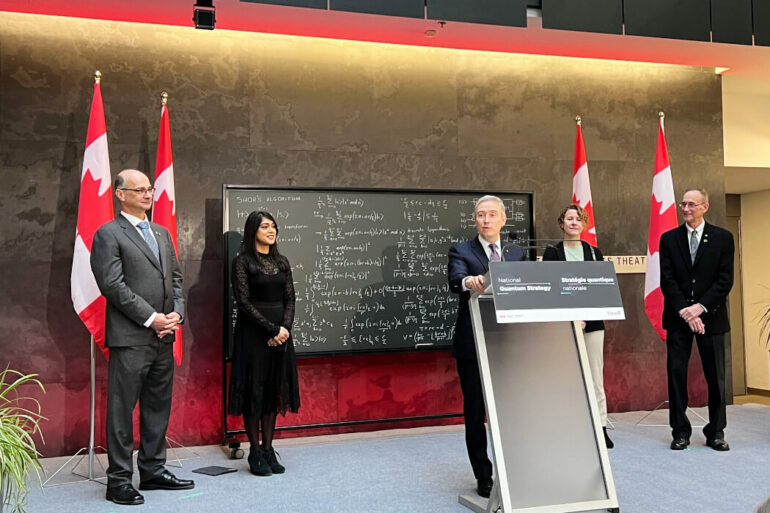The federal government has unveiled its National Quantum Strategy (NQS), which is meant to support the growth of Canada’s quantum science and technology ecosystem.
According to the Government of Canada, NQS will focus on building on Canada’s strength in quantum research, growing the nation’s quantum-ready technologies, companies and talent, and solidifying the country’s global leadership in the space.
NQS allocates $141 million to quantum research, $45 million to talent, and $169 million to commercialization.
The federal government first shared plans to create a quantum strategy in Budget 2021, allocating $360 million CAD in funding over seven years towards its design and delivery. According to The Logic, this followed a 2019 call from universities and startups for Canada to launch a $460 million national quantum strategy.
The Government of Canada introduced NQS at The Perimeter Institute for Theoretical Physics, a Kitchener-Waterloo quantum hub. During his remarks, Canada’s Minister of Innovation, Science, and Industry François-Philippe Champagne said he believes that quantum will be “an engine for growth” in the country.
“Let’s be ambitious, let’s seize the moment, and let’s make sure that the future of quantum technology starts right here in Canada,” added Champagne.
The Government of Canada has already begun deploying this $360 million amount through a combination of funding calls and other supports, including both current and new programs.
The NQS allocated $141 million in federal funding towards quantum research, $45 million to talent, and $169 million towards commercialization.
These pillars are geared towards a trio of missions. These include: making Canada a world leader in development, deployment, and use of quantum computing hardware and software; ensure privacy and cybersecurity through a national secure quantum communications network and post-quantum cryptography initiative; and helping federal government and key industries develop and become early adopters of quantum sensing technologies.
RELATED: Xanadu closes $100 million USD Series C as quantum computing firm becomes Canada’s latest unicorn
As Perimeter Institute director Robert Myers noted, this previously announced funding and formalized national quantum strategy comes at an important time for the quantum space.
“We’re seeing more private partners joining us in our research across Canada, we’re seeing more startups, and more investments,” said Myers. “The world is on the cusp of a quantum revolution. These are exciting times.”
Canada currently plays home to a growing quantum ecosystem, from hubs like the Perimeter Institute, PINQ2, and Quantum City, to companies like Xanadu, D-Wave, and Nord Quantique, to investors like BDC Capital, RiSC Capital, Boreal Ventures, and Innovobot.
“We are in a good place, but we need to make sure we are organized and deliberate in terms of keeping that leading position,” Champagne told BetaKit in an interview.
So far, the development of quantum computers has been slow moving. But the industry saw a number of advances on the research front during 2022, including north of the border. To date, several companies have developed quantum computer prototypes, from Big Tech firms like Google and IBM, to startups like Xanadu.
RELATED: Innovobot holds initial close of targeted $40 million fund to invest in “deep tech for good”
For its part, Toronto-based Xanadu recently hit an elusive milestone with its Borealis machine, delivering a result beyond the practical reach of a conventional computer system, according to a paper published in research journal Nature.
Nearly half of NQS’ funding is geared towards commercialization. Champagne said the federal government wants to help companies with promising quantum technologies like Xanadu bring their tech to market.
To remain a leader in the space, Champagne said Canada needs to be “more ambitious.”
“Quantum is not vertical, it’s horizontal,” added Champagne. “Like AI, it is going to have an impact on everything.”
The launch of NQS follows consultations that have helped shape the strategy. One finding from these consultations was that “the overall amount of NQS funding may be insufficient to achieve our goals, especially as other countries have promised to invest more.”
Asked how far this $360 million from the Government of Canada will go, Myers said: “It is important to think that this is not only the end. This is the beginning of developing a quantum ecosystem across Canada.”
Feature image courtesy Berry Vrbanovic via Twitter.


